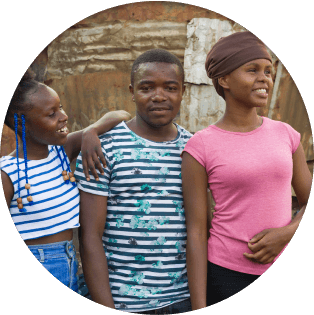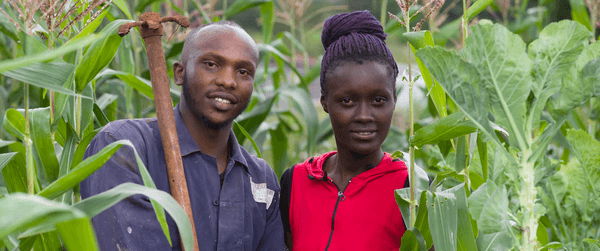Votes were stolen in every past election. And the youth? We lost faith in the voting process. But maybe now, things can change.
As of the end of 2021, over 8 million 18-24-year-olds in Kenya were eligible to vote in the 2022 general election. That’s the largest youth electorate in Kenyan history, representing around 28% of the total electorate.
But by May 2022, as voter registration ended, the IEBC reported that just under 2.3 million Kenyans aged 18 to 24 had registered to vote.37
Young people’s voices were under-represented in the 2022 elections
The IEBC has not released demographic voter data, however our research suggests that some recurring factors are likely to have impacted who turned out to vote. For example, young women are slightly less likely to plan to vote than men (63% compared to 68%), while 80% of young Kenyans in post-secondary education said they intended to vote, compared to 61% with less than primary education. And intention to vote increased from 42% among the lowest earners to 74% in the highest.
But, as polls closed across the country in August 2022, available data suggests that young people are likely to have represented less than 10% of votes.38 So, what happened – why did young Kenyans not engage in the 2022 elections?
In focus group discussions and polling we conducted during the election period, young people cited a number of structural barriers that kept them from the polls. In particular: not having access to a national ID card; being unsure about voting procedure; or not being able to afford the cost of travel to a registration or polling station.
However in a dipstick SMS poll conducted before the election, four of the top five reasons given for not registering to vote – and half of all responses – were linked to a loss of trust in the ability of the leaders on the ballot to change their lives for the better.39
The Covid-19 pandemic is likely to have had a significant impact here. In August 2020, 84% of young people said they felt they were ignored by decision makers in the pandemic response.40 In our focus groups during the period, discussions often focused on reports of corruption, abuse and mistrust – mirroring trends in discourse online.41
Another simple factor was confusion. In a dipstick poll we ran before the elections, only half of respondents said they felt confident that they understood the electoral process, and just under 50% said they understood how Kenya’s devolved government structure works.42 The contested 2017 general election, and the legal and political confusion that followed, are likely to have contributed to that confusion.
The big trend: This generation believes in the values of democracy
It is clear that young Kenyans’ trust in formal politics has been eroded by the economic and political instability of the last 6 years, from 2017’s contested elections to the pandemic. However – far from the ‘apathetic youth’ stereotype – this generation’s belief in the values of democracy and participation remains incredibly high.
While the proportion of young people who believe they can personally play a role in local governance might be at its lowest level in the last 6 years, at 58%, it still remains an impressive figure that exceeds international benchmarks.43
Perhaps most importantly, our early research suggests the 2022 elections – the most peaceful, transparent election process in decades – might already be helping to restore this generation’s trust and confidence in Kenya’s governance structures.
The 2022 elections help to restore trust
In focus groups conducted after the elections, young people praised the work of the IEBC in helping to improve the transparency and trustworthiness of the electoral process. They talked about being reassured to see completed ballots posted online to aid verification, and being glad that appeals were conducted through the proper constitutional channels – and that the Supreme Court’s decision to uphold William Ruto’s victory was accepted peacefully on both sides.
In the same dipstick SMS survey, respondents expressed their cautious optimism about the 2022 election season. When asked to use one word to describe their reflections, 69% used positive adjectives, with the largest group (40% of all respondents) saying they felt ‘hopeful’.
Furthermore, when we look beyond ‘formal’ governance participation, more than 80% of young people say that they feel they have something to offer their communities, and to the world. This generation believe in a brighter future – and that they have a powerful role in creating one.
Governance ≠ Politics: Young Kenyans put community first
When we talk about youth ‘participation’ in governance, the conversation is often centred around formal politics: voting, campaigning or standing for election.
But the reality is, that’s only part of the story. ‘Participation’ can mean something formal, like going to a baraza (council meeting). But it can also mean something more informal, like playing in a football match, or volunteering at church.
Young people are committed to their communities
When you look beyond the ballot box, you discover something important: healthy democracies are built around connected communities. ‘Governance’ is about more than ‘politics’. It happens at a micro-local level.
The most common social engagements for young people
Political scientists underline that these kinds of participation help societies to flourish.49 In fact, strong community engagement is associated with greater trust, cooperation, economic growth and democracy.50 Put simply, when young people have an active role to play in shaping their communities, everybody wins.
In our conversations with young people, we asked: “What will you do first when you achieve success?” More than 50% said: “Give back to my community, to other youth or to my family.”51 Only 3% talked about buying something for themselves. And while 82% of young Kenyans believe they have something to contribute to their communities, only 46% feel they’re able to make a big impact in their community.52
This generation has much more to contribute. And over the next 15 years, whether young people are able to participate – at every level of governance – will have defining implications for Kenya’s ability to make that ‘demographic dividend’ leap into greater economic and social prosperity.
Where next: What young people need now
After the most peaceful election in decades, and with five years to go until the next national elections, Kenya has an opportunity to engage this crucial generation from the ground up – and to rebuild their trust in political processes.
37 Independent Electoral and Boundaries Commission (September 2022) Voter Registration Age Distribution per County.
38 The exact numbers of young people who voted in the general election are yet to be released, but international patterns show it is unlikely that all those who registered will have turned out to vote on polling day.
39 Ibid.
40 SMS survey of Shujaaz fans, N=945, August 2020.
41 Shujaaz Inc (2020, Issue 2) Shujaaz Inc Compass: Navigating the Road Ahead. Generation Engaged: How Young People Can Improve Kenya’s Governance – If We Let Them.
42 Ibid.
43 A 2015 study by the Harvard Institute of Politics showed that only 20% of Americans aged 18-29 considered themselves politically engaged, and only 36% considered voting to be part of who they were. Harvard Institute of Politics, Survey of Young Americans’ Attitudes toward Politics and Public Service 28th Edition: October 30.
44 Shujaaz Inc dipstick SMS survey, October 2022 (N=194)
45 Shujaaz Inc nationally-representative survey of Kenyan youth 15-24 years old Wave 6 (N=2,006), November 2021-January 2022.
46 Ibid.
47 Ibid.
48 Ibid.
49 Putnam R. D. (1995) “Bowling Alone: America’s Declining Social Capital”. Journal of Democracy 6:1, Jan 1995, 65-78. | Stefan Vucojevic (2014) “Impact of social capital on the development of democracy”. Defendologija, v1, November 2014.
50 Ibid.
51 SMS survey with Shujaaz fans (N=417), June 2020.
52 Shujaaz Inc nationally-representative survey of Kenyan youth 15-24 years old Wave 6 (N=2,006), November 2021-January 2022.

